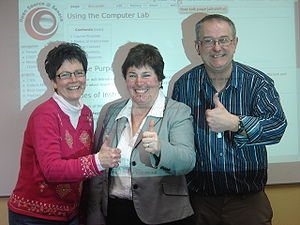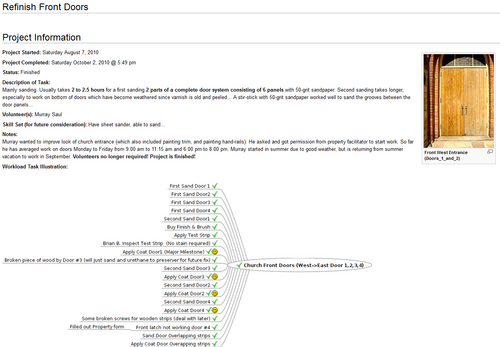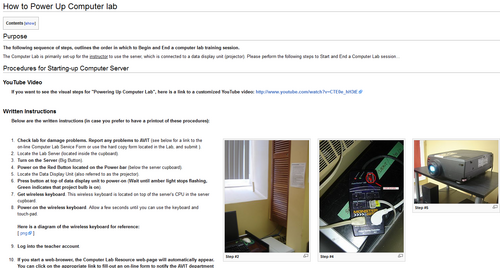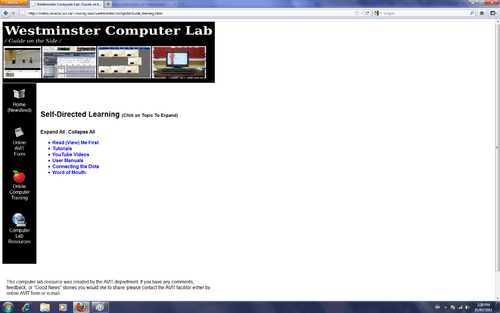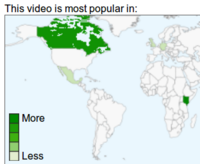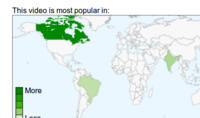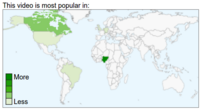Difference between revisions of "Wiki Collaboration at Westminster?"
| (128 intermediate revisions by the same user not shown) | |||
| Line 3: | Line 3: | ||
== Purpose == | == Purpose == | ||
| − | : | + | :The purpose of this "WIKI Article" is to explain '''how promoting "online collaboration" through the use of WIKIs may help to <u>reduce</u> volunteer workload, and to help build on-line databases for church-related activities'''. In turn, these databases can be used by the Westminster congregation, by the Orangeville community, and used by the entire World. |
| − | : | + | :This article is based on this author's observations and professional experience when using online collaboration tools such as WIKIs. |
==The Importance of Collaborating Online== | ==The Importance of Collaborating Online== | ||
| − | === YouTube Video === | + | ==== YouTube Video ==== |
: '''If you want to see a YouTube video discussing WIKIs, here is a link: [http://www.youtube.com/watch?v=-dnL00TdmLY http://www.youtube.com/watch?v=-dnL00TdmLY] | : '''If you want to see a YouTube video discussing WIKIs, here is a link: [http://www.youtube.com/watch?v=-dnL00TdmLY http://www.youtube.com/watch?v=-dnL00TdmLY] | ||
| − | === Written Concepts === | + | ==== Written Concepts ==== |
:'''Below are the written concepts (in case you prefer to have a printout of these concepts or suggestions):''' | :'''Below are the written concepts (in case you prefer to have a printout of these concepts or suggestions):''' | ||
| − | ===A Little History and Perspective=== | + | ====A Little History and Perspective==== |
| − | :'''The concept of collaborating on-line is <u>not</u> new'''. Even the predecessor to the Internet ('''ARPAnet''') | + | :'''The concept of collaborating on-line is <u>not</u> new'''. Even the predecessor to the Internet ('''ARPAnet''') was developed by the U.S. military in the 60's using computer networking as a defensive counter-measure to discourage a Soviet nuclear "first strike". Out of this system rose the '''MAD doctrine''' (Mutually Assured Destruction). This, in turn, assisted in the reduction of nuclear arms via non-proliferation treaties. |
| − | :In the 70s and 80s, there was a need for nuclear and rocket scientists to collaborate in order to advance nuclear missile research. | + | :In the 70s and 80s, there was a need for nuclear and rocket scientists to collaborate in order to advance nuclear missile research. These scientists needed a way see the "big picture" as opposed to only their own particular contribution. Since these scientists worked in research organizations (universities and colleges), other participants, such as instructors and students, had access to many of those collaboration tools such as e-mail, and non-graphical web-browsers to access the World Wide Web. |
| − | :'''Ironically, this communication networking system which was created as a "defensive weapon", developed into an infrastructure to help | + | :'''Ironically, this communication networking system which was created as a "defensive weapon", developed into an infrastructure to help promote peace and to help "bring people together"'''. |
:That is what I would call an unexpected but highly pleasant side-effect! :) | :That is what I would call an unexpected but highly pleasant side-effect! :) | ||
| − | : | + | :Since the early 70s, computer programmers collaborated via computer networks to develop software applications. The '''open-source''' collaborative model is considered to be the most cost-effective "benchmark model" of developing software. In fact, it has long been recognized that Linux is the largest on-line collaborative project in the World. '''If the new catch-phrase "Working in the Cloud" applies to storing documents and editing them within the Internet, then this author has been "Working in the Cloud" since 1998 (long before this "catch-phrase" was invented)...''' |
| − | |||
| − | |||
| − | ::*'''Smart phones''', '''Blackberries''', '''tablets''', etc | + | [[Image:wikiProject.png|thumb|500px | '''Wikis can be used to document church projects'''. These can be used as "time capsules" providing information, reflection, and historical significance. '''Mind-Maps can be incorporated into the WIKI to show up-to-date status of project's progress'''.]] |
| − | ::*'''Checking e-mail''' on a daily basis | + | :'''This "need to connect" has extended beyond educational institutions, and into our daily lives:''' |
| − | ::*'''Checking weather conditions''' or '''checking school cancellations''' on web-pages | + | |
| − | ::*''' | + | ::*'''Smart phones''', '''Blackberries''', '''tablets''', etc. |
| − | ::*Feeling of '''"disconnection from World" if Internet service is down | + | ::*'''Checking e-mail''' on a daily basis. |
| + | ::*'''Checking weather conditions''' or '''checking school cancellations''' on web-pages. | ||
| + | ::*'''No longer a luxury, but rather an expectation, of wireless connectivity in public places''' (eg. McDonalds has now gone wireless). | ||
| + | ::*Feeling of '''"disconnection from World"''' if Internet service is down. | ||
| Line 58: | Line 59: | ||
===The Wrong "Ties That Bind"=== | ===The Wrong "Ties That Bind"=== | ||
| − | [[Image:wikiMeeting.png|thumb|500px|'''Wiki Meetings can be held over longer periods of time, and allow busy individuals to contribute from the comfort of their own home'''. Minutes of those meetings would | + | [[Image:wikiMeeting.png|thumb|500px|'''Wiki Meetings can be held over longer periods of time, and allow busy individuals to contribute from the comfort of their own home'''. Minutes of those meetings would automatically be documented online (no note-taker required). Wikis can also be used to '''"better prepare meeting content or concerns" to help reduce face-to-face meeting time'''. ]] |
| − | :'''Unfortunately, people are instinctively <u>hesitant</u> or <u>protective</u> when faced with exposing their work or contribution to | + | :'''Unfortunately, people are instinctively <u>hesitant</u> or <u>protective</u> when faced with exposing their work or contribution to "public editing".''' |
| − | :'''There are many factors that act as | + | :'''There are many factors that act as natural barriers to open on-line collaboration:''' |
| Line 68: | Line 69: | ||
::'''Not all Social Media Works in the Same Manner''' | ::'''Not all Social Media Works in the Same Manner''' | ||
:::''For example, '''Facebook''' and '''Twitter''' are useful for posting messages and keeping in touch with friends and events,<br />but they lack the ability to '''create and collectively edit''' ideas and document content in a transparent manner''. | :::''For example, '''Facebook''' and '''Twitter''' are useful for posting messages and keeping in touch with friends and events,<br />but they lack the ability to '''create and collectively edit''' ideas and document content in a transparent manner''. | ||
| − | ::'''Disconnection of Document | + | ::'''Disconnection of Document Generation and Editing''' |
| − | ::: Documents involving word-processing, spreadsheets, and slide-shows are mainly edited "off-line", which '''requires more work downloading and uploading files'''. Although they may be posted to web-pages, '''those documents are not real "living documents"''', instead they represent a "one-way flow" of information. Also, those '''documents | + | ::: Documents involving word-processing, spreadsheets, and slide-shows are mainly edited "off-line", which '''requires more work downloading and uploading files'''. Although they may be posted to web-pages, '''those documents are not real "living documents"''', instead they represent a "one-way flow" of information. Also, those '''documents usually become "out-of-date" very quickly, until those documents are downloaded, re-edited, saved, and uploaded'''. |
::'''Inconsistent Perceptions''' | ::'''Inconsistent Perceptions''' | ||
| − | :::In my opinion, if I asked a random group of people '''what a WIKI was, eighty-five percent would respond, "What is a WIKI?"'''. On the other hand, | + | :::In my opinion, if I asked a random group of people '''what a WIKI was, eighty-five percent would respond, "What is a WIKI?"'''. On the other hand, if I asked that same group '''how many of them have used WikiPedia, eighty-five percent would respond, "Yes"'''. If I asked that same group '''how many people have added or edited content on a Wikepedia topic, <u>less than one tenth of one percent</u> would respond, "Yes"'''. |
| − | |||
| − | |||
| + | :'''In fact, without consciously knowing it, most of us have been conditioned to avoid on-line collaboration:''' | ||
| + | [[Image:wikiInstrucion.png|thumb|500px|'''WIKIs can be used to provide immediate up-to-date training procedures'''<br />(for example: computer lab startup/shutdown) ]] | ||
::'''Fear of Change''' | ::'''Fear of Change''' | ||
| − | :::''It is a fact that '''most people are hesitant to accept change''' (even if it will benefit them in the future)''. | + | :::''It is a fact that '''most people are hesitant to accept change''' (even if it will benefit them in the future)''. |
::'''Fear of Commitment (especially time)''' | ::'''Fear of Commitment (especially time)''' | ||
:::''Time-strapped individuals do not treat this "learning curve" in on-line collaboration as an investment that will reduce volunteer time (especially when applied to database building and remote time-flexible meetings). | :::''Time-strapped individuals do not treat this "learning curve" in on-line collaboration as an investment that will reduce volunteer time (especially when applied to database building and remote time-flexible meetings). | ||
::'''Fear of Participation''' | ::'''Fear of Participation''' | ||
| − | :::People may find that they don't have much to offer on the wiki, but participation can be simple such as editing spelling and grammar. '''Participation in a WIKI could be considered a true form of democracy, as opposed to web-pages''' | + | :::People may find that they don't have much to offer on the wiki, but participation can be simple such as editing spelling and grammar. '''Participation in a WIKI could be considered a true form of democracy, as opposed to web-pages''' (where the author can decide to post or delete comments). '''Churches are prime benefactors for on-line collaboration in order to support and build their congregation, "social outreach", and "social justice"'''. |
| − | ::'''Jotting notes with pen and | + | ::'''Jotting notes with pen and pencil''' |
:::''WIKIs did not exist when many of us were educated.'' | :::''WIKIs did not exist when many of us were educated.'' | ||
::'''On-line Collaboration is Cheating''' | ::'''On-line Collaboration is Cheating''' | ||
| − | :::''Students today are '''learning how to collaborate in order to be successful in their future lives'''. This directive has been adopted into provincial school curriculum since this is the <u>skill</u> that | + | :::''Students today are '''learning how to collaborate in order to be successful in their future lives'''. This directive has been adopted into provincial school curriculum since this is the <u>skill</u> that businesses and our society <u>demand</u> from our future citizens''. Unfortunately, older generations have not been exposed to the advantages of open-collaboration, and remain working in more traditional "off-line" forms of collaboration. |
| − | ::'''Outdated Teaching''' | + | ::'''Outdated Teaching Methods''' |
| − | :::The youth are more comfortable and adaptable with on-line collaboration. Unfortunately, if instructors fail to embrace newer technologies, they may impede the growth of | + | :::The youth are more comfortable and adaptable with on-line collaboration. Unfortunately, if instructors fail to embrace newer technologies, they may impede the growth of their students. If properly utilized and monitored, '''instructors could be "leading the students by example" to prepare them to collaborate in a proactive manner while at the same time enforcing classic concepts such as "critical thinking", "research", and "citing sources (both on-line and off-line)"'''. |
::'''Private Interests''' | ::'''Private Interests''' | ||
| − | :::'''Trying to own a collaborative idea or concept can limit its growth or success'''. When people mention that I should copyright the [http://matrix.senecac.on.ca/~murray.saul/westminster/computerGuide_training.html "/Guide on the Side/"] Computer Lab resource, I immediately respond, ''"that would immediately destroy what I have created"''. I adopt the attitude, "what you give usually will come back ten-fold". Instead of limiting that resource only to the Westminster Computer Lab, it should be freely available to benefit the World. Many private interests are trying to compete | + | :::'''Trying to own a collaborative idea or concept can limit its growth or success'''. When people mention that I should copyright the <br />[http://matrix.senecac.on.ca/~murray.saul/westminster/computerGuide_training.html "/Guide on the Side/"] Computer Lab resource, I immediately respond, ''''"that would immediately destroy what I have created"''''. I adopt the attitude, ''''"what you give usually will come back ten-fold"''''. Instead of limiting that resource only to the Westminster Computer Lab, it should be freely available to benefit the World. Many private interests are trying to compete and control online storage and document manipulation. Free software proponents such as '''Richard Stallman''' see the industry term '''"cloud computing"''' as nothing more than a '''"marketing gimmick"''' (Apple recently rolled-out its attempt called '''icloud'''). Many computer program developers have collaborated for decade<u>'''s'''</u> before the term "cloud computing" became fashionable... |
| − | ===Hidden Opportunity Costs=== | + | ====Hidden Opportunity Costs==== |
| − | [[Image:computerResource.png|thumb|500px|'''Since WIKI contents are accessible via the Internet, elements can be "woven" into a comprehensive and customized resource'''. ]] | + | [[Image:computerResource.png|thumb|500px|'''Since WIKI contents are accessible via the Internet, elements can be "woven" into a comprehensive and customized resource''' <br />(for example: a web-page). ]] |
:'''Westminster United Church can survive without WIKIs'''. Technical aspects of this church (in terms of computers) only make up tiny elements of what the church does. In reality, it is the <u>contribution</u> of the church <u>members</u> and <u>volunteers</u> that keep the church operating. | :'''Westminster United Church can survive without WIKIs'''. Technical aspects of this church (in terms of computers) only make up tiny elements of what the church does. In reality, it is the <u>contribution</u> of the church <u>members</u> and <u>volunteers</u> that keep the church operating. | ||
| − | :On the other hand, computer tools (such as WIKIs | + | :On the other hand, computer tools (such as WIKIs) can help increase the productivity and communication of its membership. This author is a BIG BELIEVER in "opportunity costs". '''These hidden costs from not embracing newer forms of online collaboration will "creep-up" and cause "friction" and "drag" to impede church projects or initiatives'''. |
:'''A picture is worth a thousand words:''' [http://www.wikinomics.com/blog/index.php/2008/03/26/wiki-collaboration-leads-to-happiness/ http://www.wikinomics.com/blog/index.php/2008/03/26/wiki-collaboration-leads-to-happiness/] | :'''A picture is worth a thousand words:''' [http://www.wikinomics.com/blog/index.php/2008/03/26/wiki-collaboration-leads-to-happiness/ http://www.wikinomics.com/blog/index.php/2008/03/26/wiki-collaboration-leads-to-happiness/] | ||
| − | + | =="Unlock Those Chains": Collaborate Online== | |
| − | :'''Eric S. Raymond''', the author of the book '''"The Cathedral and the Bazaar"''', compares on-line collaboration for computer software development as a '''"church bazaar", where the setup is not very fancy, but the work and | + | :'''Eric S. Raymond''', the author of the book '''"The Cathedral and the Bazaar"''', compares on-line collaboration for computer software development as a '''"church bazaar", where the setup is not very fancy, but the work, enthusiasm, and coordination among church members are crucial to its success'''. |
:'''"Where can I even begin to learn about WIKIs?"''' | :'''"Where can I even begin to learn about WIKIs?"''' | ||
| Line 110: | Line 111: | ||
:'''"Simple:"''' There are many computer servers on the Internet that offer free hosting for WIKIs. | :'''"Simple:"''' There are many computer servers on the Internet that offer free hosting for WIKIs. | ||
| − | :'''Here is a site to a free WIKI host called WikiSpaces:''' [http://www.wikispaces.com/ http://www.wikispaces.com/] | + | :'''Here is a site to a free WIKI host called "WikiSpaces::''' [http://www.wikispaces.com/ http://www.wikispaces.com/] |
| + | |||
| + | :Take advantage of the on-line features of this site to help to learn how to use a WIKI: | ||
| − | : | + | ::''...No one will do the work for you''... |
| + | ::''...No one wants to listen to "excuses"''... | ||
| − | + | ::''...Take the initiative''... | |
| − | : | + | ::''...Learn how to learn.'' |
| − | |||
| + | ====Resist the Temptation to be Shy==== | ||
| − | + | :'''Contrary to general opinion, people don't mind having their WIKIs edited: they may even thank you!''' This author has created many WIKIs over a two year period. During that time <u>very very few</u> people have taken the time to edit those WIKIs. '''There is a mechanism that records WIKI <u>editing history</u> indicating both the edited content and username. The ability to see who edits a WIKI "levels the playing field"'''. The WIKI owner can always revert to a previous editing session to restore the WIKI to a previous period... | |
| − | : | + | :'''When allowing individuals the freedom to edit text at will, the quality of the WIKI's content will naturally improve (most likely at a <u>rapid</u> pace).''' |
| − | ==="Water Seeks its Own Level"=== | + | ===="Reduce, Reuse, Recycle"==== |
| + | |||
| + | :Once content is stored in WIKIs, '''it is amazing in how many ways that content can be reused'''. For example, the Westminster Computer Lab resource [http://matrix.senecac.on.ca/~murray.saul/westminster/computerGuide_home.html /Guide on the Side/] has many tutorials that are recycled WIKIs (created over a series of months / years). This web-page resource was created from scratch within a 4 week period weaving-in existing WIKIs. It would have been IMPOSSIBLE for this resource to have been created within 4 weeks by one person without these on-line collaborative tools (especially WIKIs). | ||
| + | |||
| + | |||
| + | ===="Water Seeks its Own Level"==== | ||
| + | |||
| + | :'''This author is not expecting on-line collaborative to spark an immediate "revolution"''', but rather to serve as an effective tool to help "lighten the load" of church volunteers. Although not all volunteers may use this on-line tool immediately, it is possible that a few volunteers will start to use WIKIs. '''When others individuals view the success and time-saving benefit of on-line collaboration, their attitude towards on-line collaboration will probably change'''. | ||
| + | |||
| + | |||
| + | |||
| + | ====Baby Steps: Google Docs==== | ||
| + | |||
| + | :Although using Wikis are easy, people could start to share documents online via '''Google Docs'''. This is a free service to allow individuals to share their documents such as '''word-processing''', '''spreadsheets''' and '''presentations''' with other groups, or to anyone via the Internet. The user can decide if the users can view or edit the document. Forms can be created to allow a user to embed into webpages, blogs or other social media to automatically update online documents. | ||
| + | |||
| + | :Here is an example of an '''Issue Ticketing system''' that I created to act as a "help desk" for a computer lab: [ [http://matrix.senecac.on.ca/~murray.saul/westminster/computerGuide_form.html Issue Ticketing System] ] | ||
| + | |||
| + | :If organisations are already using ''Google Calendar'', then ''Google Docs'' possibly is the next logic step towards online collaboration. | ||
| + | |||
| + | :Here is a link to the resource: [ [http://www.google.com/google-d-s/b1.html http://www.google.com/google-d-s/b1.html ] ] | ||
| − | |||
| Line 135: | Line 157: | ||
<tr valign="top"> | <tr valign="top"> | ||
<td> | <td> | ||
| − | == | + | =="An Immediate Success"== |
| − | : | + | :Investing in WIKIs has allowed this author not only to generate open-source learning content for Westminster United Church, but for anyone in the World that has a need for these learning materials. |
| − | |||
| − | : | + | :Many WIKIs that were created for the church have generated thousands of visits within a short period of time. The computer lab resource's You-Tube video statistics indicate an immediate need for open-source application training. |
| + | :Within two weeks from creating instructional YouTube videos, interest in some of these training resources have been noted from the '''United States''', '''Europe''', '''Mexico''', '''South America''', '''Africa''', and the '''Middle East'''. | ||
| + | </td> | ||
| − | |||
| − | |||
| − | |||
| − | + | <td>[[Image:YouTubeStats1.png|thumb|200px|The '''"File and Folder Management"''' YouTube video tutorial has been viewed in '''Mexico''', '''Europe''', and '''Africa''' ]]</td> | |
| − | <td>[[Image:YouTubeStats1.png|thumb| | + | <td>[[Image:youTubeStats2.png|thumb|200px|The '''"Freemind Mind-Mapping"''' YouTube video tutorial has been viewed in '''South America''' and in the '''Middle East''' ]]</td> |
| − | <td>[[Image:youTubeStats2.png|thumb| | ||
</tr> | </tr> | ||
</table> | </table> | ||
| + | [[Image:youTuveStats3.png|thumb|200px|right|The '''Pitivi Non Linear Video Editor''' tutorial has been viewed in the '''United States''', '''South America''', '''United Kingdom''', '''France''', and '''Africa'''. ]] | ||
| + | |||
| + | :'''Whether or not Westminster United Church embraces on-line collaboration, individuals from around the World are already benefiting from this self-directed learning resource'''. By taking the time to freely participate and contribute on-line, this online resource has already been a success within two weeks of its creation... that is how quickly things can happen in "Cyberspace" when using the correct online tools... this isn't "the future"... this is the "here and now"... this is the reality... | ||
| + | |||
| + | |||
| + | :''Sincerely,'' | ||
| + | :''Murray Saul'' | ||
| + | :''June 30, 2011'' | ||
Latest revision as of 08:37, 9 September 2011
Contents
Purpose
- The purpose of this "WIKI Article" is to explain how promoting "online collaboration" through the use of WIKIs may help to reduce volunteer workload, and to help build on-line databases for church-related activities. In turn, these databases can be used by the Westminster congregation, by the Orangeville community, and used by the entire World.
- This article is based on this author's observations and professional experience when using online collaboration tools such as WIKIs.
The Importance of Collaborating Online
YouTube Video
- If you want to see a YouTube video discussing WIKIs, here is a link: http://www.youtube.com/watch?v=-dnL00TdmLY
Written Concepts
- Below are the written concepts (in case you prefer to have a printout of these concepts or suggestions):
A Little History and Perspective
- The concept of collaborating on-line is not new. Even the predecessor to the Internet (ARPAnet) was developed by the U.S. military in the 60's using computer networking as a defensive counter-measure to discourage a Soviet nuclear "first strike". Out of this system rose the MAD doctrine (Mutually Assured Destruction). This, in turn, assisted in the reduction of nuclear arms via non-proliferation treaties.
- In the 70s and 80s, there was a need for nuclear and rocket scientists to collaborate in order to advance nuclear missile research. These scientists needed a way see the "big picture" as opposed to only their own particular contribution. Since these scientists worked in research organizations (universities and colleges), other participants, such as instructors and students, had access to many of those collaboration tools such as e-mail, and non-graphical web-browsers to access the World Wide Web.
- Ironically, this communication networking system which was created as a "defensive weapon", developed into an infrastructure to help promote peace and to help "bring people together".
- That is what I would call an unexpected but highly pleasant side-effect! :)
- Since the early 70s, computer programmers collaborated via computer networks to develop software applications. The open-source collaborative model is considered to be the most cost-effective "benchmark model" of developing software. In fact, it has long been recognized that Linux is the largest on-line collaborative project in the World. If the new catch-phrase "Working in the Cloud" applies to storing documents and editing them within the Internet, then this author has been "Working in the Cloud" since 1998 (long before this "catch-phrase" was invented)...
- This "need to connect" has extended beyond educational institutions, and into our daily lives:
- Smart phones, Blackberries, tablets, etc.
- Checking e-mail on a daily basis.
- Checking weather conditions or checking school cancellations on web-pages.
- No longer a luxury, but rather an expectation, of wireless connectivity in public places (eg. McDonalds has now gone wireless).
- Feeling of "disconnection from World" if Internet service is down.
- This need is further validated by rapid growth of social media applications:
- Myspace
- etc...
- This trend will not only continue, but rather accelerate as our increased need for purposeful "connection" grows.
- Although these tools are very useful, they are limited in generating large volumes of data that can be edited by any viewer (transparency).
- A WIKI supports both "data storage" and "open editing" which can be used to support "community-building".
The Wrong "Ties That Bind"
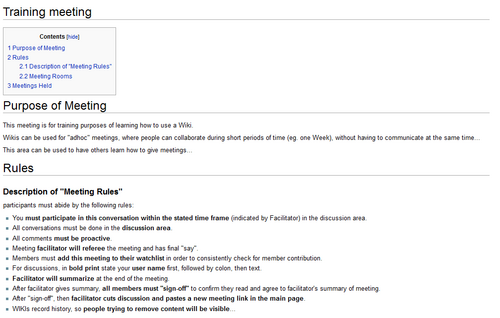
Wiki Meetings can be held over longer periods of time, and allow busy individuals to contribute from the comfort of their own home. Minutes of those meetings would automatically be documented online (no note-taker required). Wikis can also be used to "better prepare meeting content or concerns" to help reduce face-to-face meeting time.
- Unfortunately, people are instinctively hesitant or protective when faced with exposing their work or contribution to "public editing".
- There are many factors that act as natural barriers to open on-line collaboration:
- E-mail Dependence
- Although very useful, e-mail is not the best method for on-line collaboration.
- Although very useful, e-mail is not the best method for on-line collaboration.
- Not all Social Media Works in the Same Manner
- For example, Facebook and Twitter are useful for posting messages and keeping in touch with friends and events,
but they lack the ability to create and collectively edit ideas and document content in a transparent manner.
- For example, Facebook and Twitter are useful for posting messages and keeping in touch with friends and events,
- Disconnection of Document Generation and Editing
- Documents involving word-processing, spreadsheets, and slide-shows are mainly edited "off-line", which requires more work downloading and uploading files. Although they may be posted to web-pages, those documents are not real "living documents", instead they represent a "one-way flow" of information. Also, those documents usually become "out-of-date" very quickly, until those documents are downloaded, re-edited, saved, and uploaded.
- Inconsistent Perceptions
- In my opinion, if I asked a random group of people what a WIKI was, eighty-five percent would respond, "What is a WIKI?". On the other hand, if I asked that same group how many of them have used WikiPedia, eighty-five percent would respond, "Yes". If I asked that same group how many people have added or edited content on a Wikepedia topic, less than one tenth of one percent would respond, "Yes".
- E-mail Dependence
- In fact, without consciously knowing it, most of us have been conditioned to avoid on-line collaboration:
- Fear of Change
- It is a fact that most people are hesitant to accept change (even if it will benefit them in the future).
- Fear of Commitment (especially time)
- Time-strapped individuals do not treat this "learning curve" in on-line collaboration as an investment that will reduce volunteer time (especially when applied to database building and remote time-flexible meetings).
- Fear of Participation
- People may find that they don't have much to offer on the wiki, but participation can be simple such as editing spelling and grammar. Participation in a WIKI could be considered a true form of democracy, as opposed to web-pages (where the author can decide to post or delete comments). Churches are prime benefactors for on-line collaboration in order to support and build their congregation, "social outreach", and "social justice".
- Jotting notes with pen and pencil
- WIKIs did not exist when many of us were educated.
- On-line Collaboration is Cheating
- Students today are learning how to collaborate in order to be successful in their future lives. This directive has been adopted into provincial school curriculum since this is the skill that businesses and our society demand from our future citizens. Unfortunately, older generations have not been exposed to the advantages of open-collaboration, and remain working in more traditional "off-line" forms of collaboration.
- Outdated Teaching Methods
- The youth are more comfortable and adaptable with on-line collaboration. Unfortunately, if instructors fail to embrace newer technologies, they may impede the growth of their students. If properly utilized and monitored, instructors could be "leading the students by example" to prepare them to collaborate in a proactive manner while at the same time enforcing classic concepts such as "critical thinking", "research", and "citing sources (both on-line and off-line)".
- Private Interests
- Trying to own a collaborative idea or concept can limit its growth or success. When people mention that I should copyright the
"/Guide on the Side/" Computer Lab resource, I immediately respond, '"that would immediately destroy what I have created"'. I adopt the attitude, '"what you give usually will come back ten-fold"'. Instead of limiting that resource only to the Westminster Computer Lab, it should be freely available to benefit the World. Many private interests are trying to compete and control online storage and document manipulation. Free software proponents such as Richard Stallman see the industry term "cloud computing" as nothing more than a "marketing gimmick" (Apple recently rolled-out its attempt called icloud). Many computer program developers have collaborated for decades before the term "cloud computing" became fashionable...
- Trying to own a collaborative idea or concept can limit its growth or success. When people mention that I should copyright the
- Fear of Change
Hidden Opportunity Costs
- Westminster United Church can survive without WIKIs. Technical aspects of this church (in terms of computers) only make up tiny elements of what the church does. In reality, it is the contribution of the church members and volunteers that keep the church operating.
- On the other hand, computer tools (such as WIKIs) can help increase the productivity and communication of its membership. This author is a BIG BELIEVER in "opportunity costs". These hidden costs from not embracing newer forms of online collaboration will "creep-up" and cause "friction" and "drag" to impede church projects or initiatives.
- A picture is worth a thousand words: http://www.wikinomics.com/blog/index.php/2008/03/26/wiki-collaboration-leads-to-happiness/
"Unlock Those Chains": Collaborate Online
- Eric S. Raymond, the author of the book "The Cathedral and the Bazaar", compares on-line collaboration for computer software development as a "church bazaar", where the setup is not very fancy, but the work, enthusiasm, and coordination among church members are crucial to its success.
- "Where can I even begin to learn about WIKIs?"
- "Simple:" There are many computer servers on the Internet that offer free hosting for WIKIs.
- Here is a site to a free WIKI host called "WikiSpaces:: http://www.wikispaces.com/
- Take advantage of the on-line features of this site to help to learn how to use a WIKI:
- ...No one will do the work for you...
- ...No one wants to listen to "excuses"...
- ...Take the initiative...
- ...Learn how to learn.
Resist the Temptation to be Shy
- Contrary to general opinion, people don't mind having their WIKIs edited: they may even thank you! This author has created many WIKIs over a two year period. During that time very very few people have taken the time to edit those WIKIs. There is a mechanism that records WIKI editing history indicating both the edited content and username. The ability to see who edits a WIKI "levels the playing field". The WIKI owner can always revert to a previous editing session to restore the WIKI to a previous period...
- When allowing individuals the freedom to edit text at will, the quality of the WIKI's content will naturally improve (most likely at a rapid pace).
"Reduce, Reuse, Recycle"
- Once content is stored in WIKIs, it is amazing in how many ways that content can be reused. For example, the Westminster Computer Lab resource /Guide on the Side/ has many tutorials that are recycled WIKIs (created over a series of months / years). This web-page resource was created from scratch within a 4 week period weaving-in existing WIKIs. It would have been IMPOSSIBLE for this resource to have been created within 4 weeks by one person without these on-line collaborative tools (especially WIKIs).
"Water Seeks its Own Level"
- This author is not expecting on-line collaborative to spark an immediate "revolution", but rather to serve as an effective tool to help "lighten the load" of church volunteers. Although not all volunteers may use this on-line tool immediately, it is possible that a few volunteers will start to use WIKIs. When others individuals view the success and time-saving benefit of on-line collaboration, their attitude towards on-line collaboration will probably change.
Baby Steps: Google Docs
- Although using Wikis are easy, people could start to share documents online via Google Docs. This is a free service to allow individuals to share their documents such as word-processing, spreadsheets and presentations with other groups, or to anyone via the Internet. The user can decide if the users can view or edit the document. Forms can be created to allow a user to embed into webpages, blogs or other social media to automatically update online documents.
- Here is an example of an Issue Ticketing system that I created to act as a "help desk" for a computer lab: [ Issue Ticketing System ]
- If organisations are already using Google Calendar, then Google Docs possibly is the next logic step towards online collaboration.
- Here is a link to the resource: [ http://www.google.com/google-d-s/b1.html ]
"An Immediate Success"
|
- Whether or not Westminster United Church embraces on-line collaboration, individuals from around the World are already benefiting from this self-directed learning resource. By taking the time to freely participate and contribute on-line, this online resource has already been a success within two weeks of its creation... that is how quickly things can happen in "Cyberspace" when using the correct online tools... this isn't "the future"... this is the "here and now"... this is the reality...
- Sincerely,
- Murray Saul
- June 30, 2011
Additional Resources
- Here are some resources to assist the user using WIKIs:
